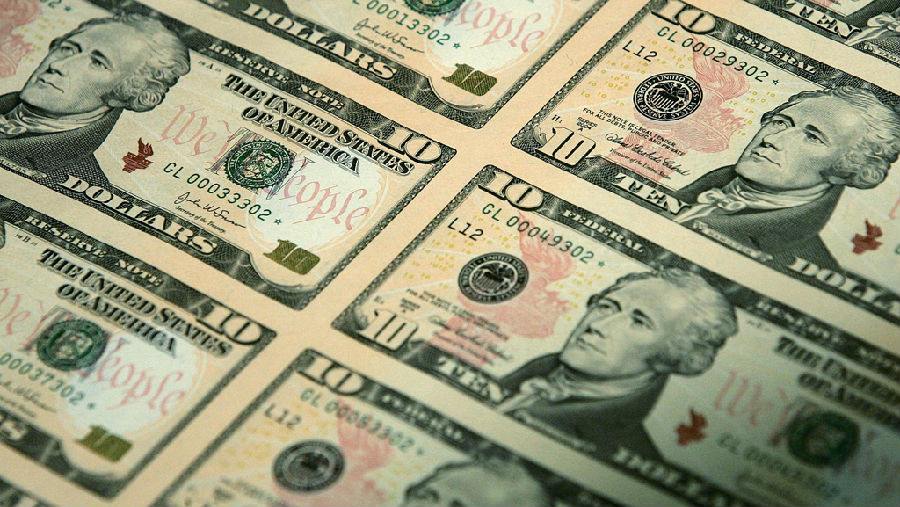Sometimes a few fractions of one percentage point make all the difference.
有的时候,差几个基点,一切都不同了。
A year ago the International Monetary Fund predicted the global economy would grow at an average annual rate of 3.65 per cent between 2017 and 2021. This October it raised that forecast fractionally to 3.7 per cent. Almost no change in the most authoritative global economic forecast has, however, coincided with a sea change in optimism.
一年前,国际货币基金组织(IMF)预计,从2017年到2021年,全球经济将会以年均3.65%的速度增长。今年10月,它将预测微幅提升至3.7%。这几乎相当于没变化,然而自从这个最具权威性的全球经济预测做出这一微调以来,情绪的乐观度出现了巨大变化。
Lamenting a “mediocre” world outlook in late 2016, Christine Lagarde, head of the IMF, now talks of a period when countries must not “let a good recovery go to waste”.
IMF总裁克里斯蒂娜?拉加德(Christine Lagarde)曾在2016年末哀叹世界的前景多么“平庸”,现在她则谈起眼下这个阶段各国不能“浪费一场可喜的复苏”。
The change in mood is understand-able. For the first year since 2010, all the leading economies are expected to ex-pand in 2017, with none in recession. This is a feat achieved for only a few years in the mid-2000s, 1997 and 1987.
这种情绪改变是可以理解的。预计2017年所有的领先经济体都将实现扩张,没有一个陷入衰退,这是2010年以来的首次。之前只有2000年代中期的几年、1997年和1987年取得了这样的成就。
Many leading economies have also performed better than expected, particularly the eurozone, China and Japan. With confidence sky high, Paul Sheard, chief economist at S&P Global, the rating agency, says US president Donald Trump “has un-leashed animal spirits”. Mr Trump has also promised to supply the US with “rocket fuel” on an already decent growth rate by means of tax cuts and Jay Powell, the new Federal Reserve chairman, is highly unlikely to take away the punch bowl soon.
许多领先经济体的表现也好于预期,尤其是欧元区、中国和日本。随着信心高涨,评级机构标普全球评级(S&P Global)首席经济学家保罗?希尔德(Paul Sheard)表示,美国总统唐纳德?特朗普(Donald Trump)“释放了动物精神”。特朗普还承诺通过减税手段为美国提供“一飞冲天的燃料”,让业已不错的增长率冲得更高,而美联储(Fed)下一任主席杰伊?鲍威尔(Jay Powell)也极不可能很快撤下“宾治盆”(punch bowl,一种装宾治酒的器皿,常常出现在狂欢派对上——译者注)。
However, the reality behind the up-beat new mood in the global economy is more complicated. Central bankers have certainly played a large part by continuing to find ways over the past decade to stimulate their economies against the headwinds of the global financial crisis.
然而,在弥漫于全球经济中的这种新的乐观情绪背后,现实状况是更为复杂的。各国央行行长们当然出了很大力,他们在过去十年中不断地设法刺激经济,以抵挡全球金融危机的逆风。
The European Central Bank, in particular, is now fairly certain that its efforts to print money, buy assets and keep interest rates in negative territory is persuading people to borrow and spend, and companies to invest. European unemployment is following the downward trajectory of that in the US and Japan, albeit around five years behind.
尤其是欧洲央行(ECB),现在基本可以肯定,该行印钞、购买资产以及维持负利率的努力,说服了人们去借贷和消费,也说服了企业去投资。欧洲失业率正在跟随美国和日本的下滑轨迹,尽管落后5年左右。
Even Mario Draghi, ECB president, is sounding more upbeat. “The economic ex--pansion in the euro area continues to be solid and broad-based?.?.?.?[and] the latest data and survey results point to un-abated growth momentum in the second half of this year,” he said, presenting the central bank’s latest monetary policy decision in October.
就连欧洲央行行长马里奥?德拉吉(Mario Draghi)的语气都乐观了起来。今年10月,在公布欧洲央行最新的货币政策决定时,他说:“欧元区经济继续坚实而全面地扩张……(而且)最新数据和调查结果显示今年下半年增长势头不减。”
A similar story can be told in Japan, while China’s monetary authorities have ensured its economy continues to expand at a rapid, but controlled pace.
日本也是类似情况,同时中国货币当局通过努力也实现了经济继续快速平稳增长。
Most governments, too, have eased their austerity programmes, giving more breathing space now that public finances have improved significantly in advanced economies.
鉴于发达经济体的公共财政有了显著改善,大多数国家也放松了财政紧缩项目,这带来了更多的喘息空间。
Yet the main reason for improved sentiment is that the yearly cycle of over-optimistic forecasts in advanced and emerging economies, which had dogged the global economy since 2010, has been broken.
然而,情绪改善的主要原因是,自2010年以来一直困扰全球经济的如下规律被打破:对发达和新兴经济体的年度预测总是过于乐观。
The absence of significant downgrades to forecasts has been refreshing.
预测数字没有重大下调实在令人畅快。
Never keen to let complacency creep in, economists have a habit of pouring cold water on optimism and those at the UK’s National Institute of Economic and Social Research are no exception. In their quarterly assessment of the global economy, published in early November, they concede that “recent months have been characterised by an unusually fav-ourable combination of global economic and financial dev-elopments”. Yet they warn that companies and households should not let the good news go to their heads. “Global growth this year and next seems likely to be as good as it gets,” they warn.
从不愿掉以轻心的经济学家们习惯于给乐观看法浇冷水,英国国家经济社会研究院(National Institute of Economic and Social Research)的那些经济学家也不例外。他们在今年11月初发表的全球经济季度评估中承认,“近月来,全球经济与金融动向都出乎意料地可喜”。 但他们警告说,企业和家庭不应该被这个好消息冲昏头脑。他们告诫道:“全球增长看上去可能会在今明两年见顶。”
There are concerns that asset markets in general have become so highly valued that a fall is likely soon. Any faltering in markets could exacerbate problems linked to $135tn of global debts, the IMF cautioned in October. “While the waters seem calm, vulnerabilities are building under the surface [and] if left unattended, these could derail the global recovery,” said Tobias Adrian, of the IMF’s financial stability watchdog.
有人担心,整个资产市场的估值已经严重虚高,可能很快就会出现价格下跌。今年10月,IMF警告称,市场出现的任何动荡,都可能加剧与135万亿美元全球债务相关的问题。IMF负责金融稳定事务的部门负责人托比亚斯?阿德里安(Tobias Adrian)表示:“尽管水面看上去很平静,但问题正在水面之下酝酿,(而)如果坐视不管,这些问题可能会毁掉全球复苏。”
In the US, too, the duration of the up-swing has reached a post-second world war record and experience suggests the risks of a recession increase materially with the length of the previous cycle.
在美国,经济上行趋势持续的时间也已创下二战后的纪录,经验表明,发生衰退的风险随着之前那个周期的长度增加而大大提高。
Much of the growth has represented a recovery from the global financial and economic crisis of 2007-09, but it has become clear that the und-erlying performance of the global economy will be weaker in future than before the crisis.
很大一部分增长是弥补了经济在2007年至2009年的全球金融和经济危机中的损失,但眼下已经很清楚的是,全球经济未来的基础表现将达不到危机之前的水平。
Among large economies, apart from in India, estimates of the potential for economic progress have been scaled back alongside evidence that productivity growth — the ability of economies to improve their efficiency in turning labour, land and capital into output — has slowed across the world.
除印度外的各大型经济体下调了对经济增长潜力的估测,同时有证据表明,全球生产率增长(经济体提高把劳动力、土地和资本转化为产出的效率的能力)放缓。
Politics is also rearing its ugly head as a threat to global economic progress. While Mr Trump’s “America First” language has not yet materialised as a significant slide towards protectionism, the risks of global trade wars are higher than ever with tensions in the negotiations over the North American Free Trade Agreement, Brexit talks under severe strain, and the US withdrawing from the Trans-Pacific Partnership trade pact. World trade growth has been lacklustre and has not convincingly broken out of its low growth phase since the global financial crisis.
政治方面的不详动向也开始对全球经济增长构成威胁。尽管特朗普的“美国优先”(America First)论调尚未落实为朝着保护主义方向的严重倒退,但眼下全球贸易战的风险高于以往任何时候,此外,围绕北美自由贸易协定(NAFTA)的谈判气氛紧张,英国退欧谈判无比艰难,美国还退出了《跨太平洋伙伴关系协议》(TPP)。全球贸易增长一直乏力,而且一直无法理直气壮地宣告已经走出全球金融危机以来的低增长阶段。

There is also little sign that many countries are using the opportunities of the recovery to reform their economies instead of simply enjoying the up-swing. They have yet to heed Ms Lagarde’s call for countries to engage in “cutting red tape, increasing spending on research and development, and investing in infrastructure”.
此外,目前几乎没有迹象表明,很多国家在利用这次复苏的机会改革其经济、而不是仅仅在享受增长行情。它们尚未听从拉加德的劝告,采取行动“减少行政上的繁文缛节、扩大研发支出并投资基础设施”。
The test of the global economy will be in the longevity and strength of the current buoyant period. Although forecasts have not yet been revised much higher, the clouds have lifted for the time being. Mostly, countries are simply happy to enjoy a period of stability and greater optimism after a dismal decade. That is fine for 2017, but soon the hard work in prolonging the recovery and protecting the world against a future downturn must begin in earnest.
对全球经济的考验将在于目前这轮经济繁荣期的长度和强度。尽管经济预测上调的幅度还不高,但目前阴云已消散。基本上,各国在度过惨淡的10年后,正开心地享受一段稳定和更加乐观的时期。2017年先享受一下没关系,但要让这轮复苏持续更久、要防止世界经济未来陷入一场低迷,我们很快就必须真正开始啃硬骨头了。













